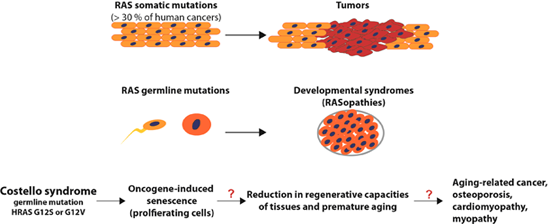TP7 - FP1
The role of oncogene-induced senescence as a tumor suppressive mechanism and as a potential premature aging trigger in Costello Syndrome
Costello Syndrome (CS) germline mutations in HRAS gene (most frequent at codon 12) affect the same residues as RAS oncogenic mutations, CS patients only occasionally develop cancer and at a lower age when compared to the general population. Combining these observations, we hypothesize that HRAS hyper activation in CS leads to oncogene-induced senescence (OIS). OIS could be the link between a premature aging program, as well as to a resistance to oncogenic transformation. Using molecular biology, protein biochemistry, cell biology and mouse models, we investigate the mechanistic link between aging and cancer and try to understand the RAS expression patterns, RAS-regulated pathways responsible for CS pathology. Identifying HRAS dysregulated pathways will open the possibility for testing small inhibitory molecules to repeal the developmental defects and to ameliorate the age-dependent worsening of the phenotype.
 Legend to Figure: xxx
Legend to Figure: xxx
Major goals:
- in vitro and in vivo identification of the molecular mechanisms leading to oncogene-induced senescence in a Costello syndrome mouse model
- revealing the antiproliferative mechanisms leading to a reduced tumor incidence in Costello syndrome patients
- proving a direct link between oncogene-induced senescence and a putative premature aging in Costello syndrome








